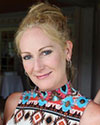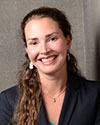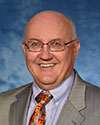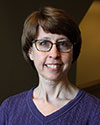Alumni Outstanding Teacher Awards are bestowed by the UT Alumni Association to recognize teaching excellence.
Tricia Hepner
 Tricia Hepner, associate professor of anthropology, is an exceptional educator, a respected leader among her colleagues, and a kind and generous person who devotes herself wholeheartedly to her scholarship and her students. Countless students have been profoundly changed after taking her classes as she challenges them to achieve their best while giving them the tools and support to do so. Hepner is director of the Disasters, Displacement, and Human Rights program, where she inspires and guides students to be change makers who challenge social inequities in order to realize a more just and peaceful world. Through innovative work spanning subdisciplines, Hepner and her students have contributed to the development of anthropology as a science, as an art, and as a tool for improving the human condition.
Tricia Hepner, associate professor of anthropology, is an exceptional educator, a respected leader among her colleagues, and a kind and generous person who devotes herself wholeheartedly to her scholarship and her students. Countless students have been profoundly changed after taking her classes as she challenges them to achieve their best while giving them the tools and support to do so. Hepner is director of the Disasters, Displacement, and Human Rights program, where she inspires and guides students to be change makers who challenge social inequities in order to realize a more just and peaceful world. Through innovative work spanning subdisciplines, Hepner and her students have contributed to the development of anthropology as a science, as an art, and as a tool for improving the human condition.
Lisa King
 Lisa King, an associate professor specializing in composition, cultural rhetorics, and American Indian rhetoric and literatures, has an approach to rhetoric that makes her students better writers while opening up a whole new world of thought. “This class blew my mind, and it’s changed the way I see the world around me,” one student wrote. “Not many other classes I’ve ever taken have kept me up at night pondering the things I learn in them, but this one has.” King’s students leave class with the confidence to think for themselves and formulate their own ideas, the research skills to support those ideas, and the critical sense to listen to opposing points of view and profit from them. Her classrooms are places where students feel welcomed and respected. Above all, King stresses that writing is a social act and has social consequences.
Lisa King, an associate professor specializing in composition, cultural rhetorics, and American Indian rhetoric and literatures, has an approach to rhetoric that makes her students better writers while opening up a whole new world of thought. “This class blew my mind, and it’s changed the way I see the world around me,” one student wrote. “Not many other classes I’ve ever taken have kept me up at night pondering the things I learn in them, but this one has.” King’s students leave class with the confidence to think for themselves and formulate their own ideas, the research skills to support those ideas, and the critical sense to listen to opposing points of view and profit from them. Her classrooms are places where students feel welcomed and respected. Above all, King stresses that writing is a social act and has social consequences.
Larry McKay
 Larry McKay, the Jones Professor of Hydrogeology in the Department of Earth and Planetary Sciences, has prepared students to land jobs at places such as NASA, Oak Ridge National Laboratory, and Texas A&M University. His PhD seminar on preparing for academic and research careers introduces students to a diverse range of career opportunities. It’s an example of McKay’s approach to teaching, which combines exploration of scientific theories and methods with development of practical professional skills. McKay aims for his classroom to be a place where students can grow intellectually as well as a training ground for the scientific workforce. From his work as a professional engineer and geoscientist, he learned that good technical training alone is not enough for a good career. “He wanted his students to develop skills in lifelong learning and teamwork, so they can adapt to changing economies and evolving career goals,” a colleague wrote. “Simply put, Larry wants his students to be successful, which is one of the key missions of a land-grant institution like UT.”
Larry McKay, the Jones Professor of Hydrogeology in the Department of Earth and Planetary Sciences, has prepared students to land jobs at places such as NASA, Oak Ridge National Laboratory, and Texas A&M University. His PhD seminar on preparing for academic and research careers introduces students to a diverse range of career opportunities. It’s an example of McKay’s approach to teaching, which combines exploration of scientific theories and methods with development of practical professional skills. McKay aims for his classroom to be a place where students can grow intellectually as well as a training ground for the scientific workforce. From his work as a professional engineer and geoscientist, he learned that good technical training alone is not enough for a good career. “He wanted his students to develop skills in lifelong learning and teamwork, so they can adapt to changing economies and evolving career goals,” a colleague wrote. “Simply put, Larry wants his students to be successful, which is one of the key missions of a land-grant institution like UT.”
Elizabeth McPherson
 Elizabeth McPherson, who has worked at UT since 1994, is a Distinguished Lecturer in microbiology. McPherson teaches Microbiology 210, an introductory course for nonmajors, with hundreds of students from a wide array of disciplines. To engage them in difficult subject matter, she uses current technologies and unconventional teaching approaches including backward course design, where the instructor writes the exam questions before lecturing on the covered material. It’s an approach that has resulted in students earning higher test scores and better comprehending the material. “Many people believe that science is difficult, is full of confusing and archaic terms, and is dull and dry,” McPherson said. “Teaching allows me to show students that science can be fun, interesting, understandable, and incredibly exciting.” She is also deeply invested in training graduate students and sharing her innovative approaches with them. She implemented a fall semester training session to help graduate teaching assistants in biology become more effective communicators and instructors.
Elizabeth McPherson, who has worked at UT since 1994, is a Distinguished Lecturer in microbiology. McPherson teaches Microbiology 210, an introductory course for nonmajors, with hundreds of students from a wide array of disciplines. To engage them in difficult subject matter, she uses current technologies and unconventional teaching approaches including backward course design, where the instructor writes the exam questions before lecturing on the covered material. It’s an approach that has resulted in students earning higher test scores and better comprehending the material. “Many people believe that science is difficult, is full of confusing and archaic terms, and is dull and dry,” McPherson said. “Teaching allows me to show students that science can be fun, interesting, understandable, and incredibly exciting.” She is also deeply invested in training graduate students and sharing her innovative approaches with them. She implemented a fall semester training session to help graduate teaching assistants in biology become more effective communicators and instructors.